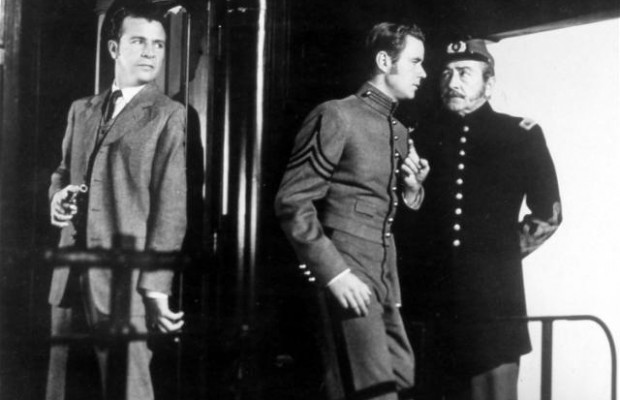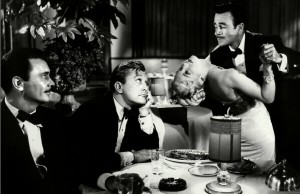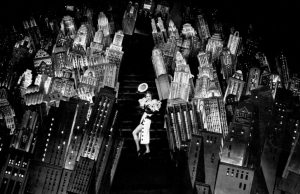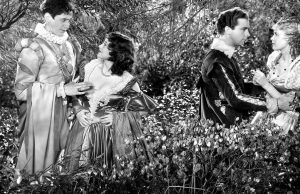The Tall Target (1951)

Toronto Film Society presented The Tall Target on Monday, March 3, 2014 in a double bill with Raw Deal as part of the Season 66 Monday Night Film Buff Series, Programme 6.
Production Company: MGM. Producer: Richard Goldstone Director: Anthony Mann. Script: George Worthington Yates, Daniel Mainwaring. Cinematography: Paul Vogel. Editor: Newell P. Kimlin. Art Direction: Cedric Gibbons, Eddie Imazu.
Cast: Dick Powell (John Kennedy), Paula Raymond (Ginny Beaufort), Adolphe Menjou (Colonal Caleb Jeffers), Marshall Thompson (Lance Beaufort)), Ruby Dee (Rachel), Richard Rober (Lieutenant Coulter), Leif Erikson (Stranger), Will Geer (Homer Crowley), Florence Bates (Mrs. Charlotte Alsop).
Plot
The basic story is historically correct, though some of the characters involved are fictionalised. President-elect Abraham Lincoln is travelling by train to Washington for his inauguration, with a stop to change trains in Baltimore. Hostility to him from southern states is running very high and the outbreak of the Civil War is imminent. Learning of a planned assassination attempt, New York detective John Kennedy tries to alert his superiors, but is ignored and decides to take action and board the train on his own.
Reception
Anthony Mann’s status as a major director of films noir and Westerns is nowadays secure, but critics of the time were baffled by the film and had no idea what to make of it. Bosley Crowther of the New York Times, the most bone-headed (and, unfortunately influential) of the major newspaper critics of the day, could not contain his scorn: the movie, he claimed,  had a “silly murder plot” and “after clattering through the night in tedious fashion, with occasional characters dropping by the way, The Tall Target finally gets to Washington and Mr. Lincoln, in case you were wondering, does not get shot”. In contrast, contemporary opinion typically finds “a modern flavoured narrative with twists and a tense pacing and editing style”, and that “Difficult times full of both clever treachery and false honour are convincingly depicted.”
had a “silly murder plot” and “after clattering through the night in tedious fashion, with occasional characters dropping by the way, The Tall Target finally gets to Washington and Mr. Lincoln, in case you were wondering, does not get shot”. In contrast, contemporary opinion typically finds “a modern flavoured narrative with twists and a tense pacing and editing style”, and that “Difficult times full of both clever treachery and false honour are convincingly depicted.”
Anthony Mann (1906-1967).
Born Emil Anton Bundesmann. He began as an actor in off-Broadway plays, then moved to Hollywood in 1938, where he joined Selznick International Pictures. He became an assistant director in 1942, and made low-budget films for RKO and Republic. He directed a series of B-pictures in various genres from 1942 to 1946 before beginning to produce thrillers and films noir, which began to attract critical attention. With films like Strangers in the Night (1944) and Strange Impersonation (1946) he showed an interest in revenge melodramas that were followed up in the Westerns that he began to make with Devil’s Doorway, The Furies and Winchester 73 (all in 1950) and he then specialised in Westerns for most of the 1950s, creating a series of masterpieces that compete for quality only with the work of John Ford and Sam Peckinpah. These were uncompromisingly tough “psychological” Westerns and featured recurrent themes of revenge, obsession and rape. They were also superbly photographed on location, amidst spectacular, rugged scenery, providing an effective backdrop for the narrative and a counterpoint to the leading character=s psyche. He made five of these films with James Stewart, creating a whole new persona for the actor–from the amiable and thoroughly decent bumbler of his earlier films to a far darker and more ambiguous hero, capable of rage, cynicism and ruthlessness that was partially foreshadowed in the scenes in It’s a Wonderful Life of what Bedford Falls would have been like if George Bailey hadn’t lived, and was followed up to some extent by Hitchcock in Rear Window and, especially Vertigo. The Tin Star in 1957 starred Henry Fonda rather than Stewart, but also transformed the actor’s wholesome and positive personality into something more sinister that in turn was followed up by Sergio Leone in Once Upon a Time in the West.
His later career produced two of the finest Hollywood epics, El Cid (1961) and The Fall of the Roman Empire (1964), and some war films–Strategic Air Command (1955), Men in War (1957) and The Heroes of Telemark (1965). He was hired as the original director of Spartacus, but fell out with Kirk Douglas and was replaced by Stanley Kubrick after, reputedly, filming the gladiator scenes. He died while filming A Dandy in Aspic in 1968 and the film was completed by its star Laurence Harvey.
Dick Powell (1904-1963)
He found early success as a singer and recording artist and was offered a film contract by Warners in 1932. He went on to star as singer and dancer in such musicals as 42nd Street, Footlight Parade, and Gold Diggers of 1933, often co-starring with Ruby Keeler and Joan Blondell (who he married but later divorced). But he became tired of being typecast in these  roles and wanted to try something more challenging, despite stiff resistance from Warners. Finally, however, after trying but failing to get the lead role in Double Indemnity, he was cast as Philip Marlowe in Murder, My Sweet, based on Raymond Chandler’s novel Farewell My Lovely, directed by Edward Dmytryk and produced by RKO. The film was a great success and Powell had finally established himself as a serious dramatic actor. He then teamed with Dmytryk for the film noir Cornered in 1945, followed by other thrillers in which he generally played the role of a tough guy. In the 1950s he turned his attention to directing, but without much success, and then focussed more on radio and television, especially with The Dick Powell Show in 1962-63, an anthology series with many guest stars. He died of cancer in 1963, and his death has sometimes been attributed to his filming The Conqueror in Utah in 1956, close to an atomic testing area. Several others involved in that film, including John Wayne, also later died of cancer.
roles and wanted to try something more challenging, despite stiff resistance from Warners. Finally, however, after trying but failing to get the lead role in Double Indemnity, he was cast as Philip Marlowe in Murder, My Sweet, based on Raymond Chandler’s novel Farewell My Lovely, directed by Edward Dmytryk and produced by RKO. The film was a great success and Powell had finally established himself as a serious dramatic actor. He then teamed with Dmytryk for the film noir Cornered in 1945, followed by other thrillers in which he generally played the role of a tough guy. In the 1950s he turned his attention to directing, but without much success, and then focussed more on radio and television, especially with The Dick Powell Show in 1962-63, an anthology series with many guest stars. He died of cancer in 1963, and his death has sometimes been attributed to his filming The Conqueror in Utah in 1956, close to an atomic testing area. Several others involved in that film, including John Wayne, also later died of cancer.
Adolphe Menjou (1890-1963)
He was born in Pittsburgh to a French father and Irish mother and graduated from CornellUniversity with a degree in engineering. But he was more interested in vaudeville and the stage and made his movie debut in 1916.After military service in World War I he became a star in such films as The Sheik and The Three Musketeers, and notably in Chaplin’s A Woman  of Paris in 1923, in which he established the persona of an elegant, well-dressed but often morally unscrupulous man-about-town, that was effectively utilised by Ernst Lubitsch and others. He moved smoothly into roles in sound films such as the 1931 The Front Page, Morocco, A Star is Born, Stage Door and others, and, in 1948, State of the Union, where he co-starred with Katharine Hepburn, whose strong Democratic sympathies were in stark contrast to Menjou’s equally fervent Republicanism. The two of them loathed each other and spoke only when the script required it. Menjou then went on to co-operate enthusiastically with the House Committee on Un-American Activities in its investigations into alleged Communist infiltration into the film industry and the resulting blacklisting of many Hollywood directors and actors. His finest later performance was as the unscrupulous General Broulard in Stanley Kubricks Paths of Glory in 1957.
of Paris in 1923, in which he established the persona of an elegant, well-dressed but often morally unscrupulous man-about-town, that was effectively utilised by Ernst Lubitsch and others. He moved smoothly into roles in sound films such as the 1931 The Front Page, Morocco, A Star is Born, Stage Door and others, and, in 1948, State of the Union, where he co-starred with Katharine Hepburn, whose strong Democratic sympathies were in stark contrast to Menjou’s equally fervent Republicanism. The two of them loathed each other and spoke only when the script required it. Menjou then went on to co-operate enthusiastically with the House Committee on Un-American Activities in its investigations into alleged Communist infiltration into the film industry and the resulting blacklisting of many Hollywood directors and actors. His finest later performance was as the unscrupulous General Broulard in Stanley Kubricks Paths of Glory in 1957.
Notes by Graham Petrie










Leave a Reply